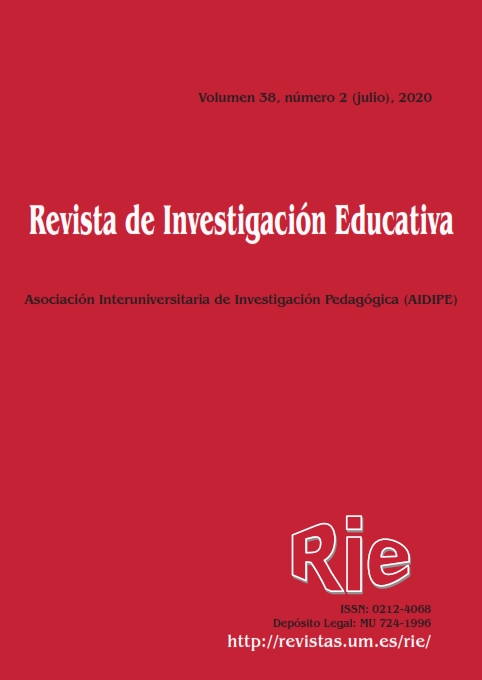Evaluation of self-efficacy, expectations and academic goals associated with school performance.
Supporting Agencies
- Español
Abstract
The aim of the present study was to verify the model of academic performance proposed in the Social Cognitive Career theory. For this purpose, three scales were constructed to evaluate self-efficacy, outcome expectations and goals setting in relation to general academic performance in the Mexican population. The construct validity of each scale was obtained through expert judgement, piloting and final application to a sample of 300 high school students of Aguascalientes. Thus, student t tests, exploratory and confirmatory factorial analyses were performed, and finally the Cronbach's Alpha coefficient was obtained to establish reliability. The scale of self-efficacy was composed of 15 items and four dimensions: learning strategies, compliance with standards, confronting adverse situations and organizing strategies. The scale of outcome expectations was composed of 10 items and three dimensions: continuation of studies, academic recognition and family recognition. The goals setting scale was composed of 9 items and two dimensions: short-term academic goals and long-term academic goals. The results of the present investigation allowed us to conclude that the three scales obtained adequate internal consistency, factorial and concurrent validity. The multiple regression analysis showed that the best academic performance model is one that includes the variables of previous performance, self-efficacy and outcome expectations. In conclusion, we obtained three scales that evaluate three cognitive variables, with empirical support for the use of the academic performance model in Mexican adolescents.
Downloads
-
Abstract7682
-
PDF (Español (España))5420
References
Aranda, A. F., Pastor, V. M. L., Oliva, F. J. C., & Romero, R. (2013). La evaluación formativa en docencia universitaria y el rendimiento académico del alumnado. Aula abierta, 41(2), 23-34.
Bandura. (1986). Social foundations of thought and action: A social cognitive theory. NY: Prentice-Hall.
Bandura, A. (1999). Social Cognitive Theory of Personality. New York: Guilford Press.
Barahona, P. (2014). Factores determinantes del rendimiento académico de los estudiantes de la Universidad de Atacama. Estudios pedagógicos (Valdivia), 40(1), 25-39.
Carretero-Dios, H., & Pérez, C. (2005). Normas para el desarrollo y revisión de estudios instrumentales. International Journal of clinical and health psychology, 5(3), 521-551. Recuperado de http://www.redalyc.org/articulo.oa?id=33705307
Cupani, M., & Gnavi, G. A. (2007). Un modelo social-cognitivo del rendimiento en Matemática: estudios de tres escalas. Perspectivas en Psicología, 4(1), 19-27.
Cupani, M. (2010). Validación de una nueva Escala de Expectativas de Resultados y Metas de Rendimiento para Matemática. Interdisciplinaria, 27(1), 111-127.
Edel Navarro, R. (2003). El rendimiento académico: concepto, investigación y desarrollo. REICE. Revista Iberoamericana sobre Calidad, Eficacia y Cambio en Educación, 1(2).
Fernandez, P. (2008). Modelos de medida y análisis factorial confirmatorio. En M. Verdugo, M. Crespo, Badía. M y B. Arias (Eds.) Metodología en la investigación sobre discapacidad. Introducción al uso de las ecuaciones estructurales (pp. 29-41). Salamanca: INICO
Fouad, N. A., Smith, P. L., & Enochs, L. (1997). Reliability and validity evidence for the middle school self-efficacy scale. Measurement and Evaluation in Counseling and Development, 30(1), 17.
George, D., & Mallery, P. (2003). SPSS for Windows step by step: answers to selected exercises. A Simple Guide and Reference. Boston, EEUU: Allyn and Bacon.
Lent, R. W., Brown, S. D., & Hackett, G. (1994). Toward a unifying social cognitive theory of career and academic interest, choice, and performance. Journal of vocational behavior, 45(1), 79-122. doi: org/10.1006/jvbe.1994.1027
Lent, R. W., & Brown, S. D. (2006). On conceptualizing and assessing social cognitive constructs in career research: A measurement guide. Journal of career assessment, 14(1), 12-35. doi:10.1177/1069072705281364
Nunnally, J.C. & Bernstein, I.J. (1995). Teoría psicométrica. Madrid: McGraw-Hill.
Pardo, A., & Ruiz, M. (2005). Análisis de datos con SPSS 13 Base. España: McGraw Hill.
Pajares, F. (1996). Self efficacy beliefs in academic settings. Review of educational research, 66(4), 543- 578. doi:10.3102/00346543066004543
Pérez, E. R., & Cupani, M. (2008). Validación del inventario de autoeficacia para inteligencias múltiples revisado (IAMI-R). Revista Latinoamericana de Psicología, 40(1), 47-58.
Sociedad Mexicana de Psicología. (2010). Código ético del psicólogo. Trillas.
Vargas, G. (2007). Factores asociados al rendimiento académico en estudiantes universitarios, una reflexión desde la calidad de la educación superior pública. Revista educación, 31(1), 43-63.
Vélez Van Meerbeke, A., & Roa, C. (2005). Factores asociados al rendimiento académico en estudiantes de medicina. Educación médica, 8(2), 24-32.
The articles and scientific documents published in RIE abide the following conditions:
1. The Servicio de Publicaciones de la Universidad de Murcia (the publisher) has the property rights (copyright) of all the documents published and allows the reuse under the user’s license indicated in point 2.
2. All documents are published in the digital edition of RIE under a Creative Commons Reconocimiento-NoComercial-SinObraDerivada 4.0 Internacional. (legal document) license. These documents can be copied, used, distributed, communicated and explained publicly if: i) the author(s) and its original source of publishing (magazine, publisher and URL of the document) are cited; ii) it is not used for commercial purpose; iii) the existence and the specifications about this license are mentioned.
3. Auto-archive’s conditions. The authors are allowed and encouraged to digitally distribute the pre-print versions (a version before evaluation) and/or post-print (a version that it is already evaluated and accepted to its publication). This promotes circulation and distribution earlier and can increase the citations and significance within the academic community.










